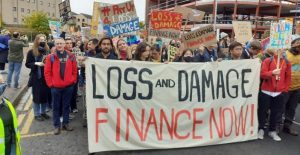Over 170 organisations from the humanitarian, climate and development sectors on Thursday, October 12, 2023, issued a joint call demanding Loss and Damage finance, under the United Nations Framework Convention on Climate Change (UNFCCC), based on four priorities: access, adequacy, additionality, and accountability.

The full letter, which can be read here, comes just days before governments meet in Aswan, Egypt, for the fourth and final Transitional Committee meeting on Loss and Damage ahead of COP28, from October 17 to 20.
The announcement of the Loss and Damage Fund was a historic outcome from COP27, thanks to the united stand taken by developing countries and sustained advocacy from civil society.
Speaking at a press briefing on Thursday, organised by Climate Action Network, former Federal Minister for Climate Change, Pakistan and lead G77 negotiator for Loss and Damage at COP27, Senator Sherry Rehman, said: “It is absolutely urgent that the Loss and Damage fund is operationalised at COP28. Time is of the essence. We have small island states that are sinking and could disappear even within a decade. We are at an inflection point in the climate crisis and COPs and other multilateral fora are an opportunity to decide on real solutions.
“We should have had a Loss and Damage fund and the finance for it many COPs earlier. And now we cannot afford to waste time and have a ghost fund that is unable to serve the countries who desperately need help.”
Year 2023 is set to be the hottest year ever with July, August and September among the hottest months since climate records were kept. Many developing and vulnerable countries who are already burdened with unjust debt and loans are struggling to access funds to rebuild and recover from intensifying and frequent climate-induced disasters. Finance for Loss and Damage must be in addition to existing humanitarian aid measures if it is to meet the needs of the moment and the era of the polycrises.
Nishanie Jayamaha, Learning and Climate Change Programme Coordinator, ICVA, said: “Humanitarians stand united in this joint call with climate actors for loss and damage finance to be additional to humanitarian finance and to be adequate to meet the current and growing future needs of communities impacted by climate change. The Loss and Damage Fund must be ambitious and accessible by communities and local responders and must take into account the multiple dimensions of vulnerability and risk facing various contexts.”
In the past year, deliberations by the Transitional Committee on Loss and Damage, the body set up to design the fund and its implementations, have met three times but progress has been slow. Issues around the Fund’s location, sources of funding, who must pay and who gets resources are emerging as major political fault-lines between countries and threatens to weaken the Fund and its ultimate goal to deliver climate justice through timely resources to communities suffering unavoidable impacts from climate change in developing countries and who are least equipped to cope with extreme weather events.
Liane Schalatek, Associate Director, Washington Office, Heinrich Böll Stiftung, said: “For the Transitional Committee (TC) to fulfill its mandate the fourth TC meeting, members must agree on a governing instrument for a standalone Loss and Damage Fund that has the flexibility to grow with the needs, can stand the test of time, and breaks with funding approaches of the past by prioritising direct access for affected communities and people.”
Harjeet Singh, Head, Global Political Strategy, Climate Action Network International, said: “After months of relentless dialogue on the operationalisation of the Loss and Damage Fund, it is disheartening to find ourselves back at square one. Developed nations appear to be using every tactic in the book to diminish the breadth and depth of the new Fund, aiming to sidestep their responsibilities.
“As the globe grapples with unparalleled climatic catastrophes, we cannot permit more delays or deceptive maneuver. The communities bearing the brunt of these disasters, through no fault of their own, deserve genuine commitment and action, not betrayal.”
The speakers said that new and additional finance for Loss and Damage is a matter of will and not of capacity with rich nations pouring billions at short notice for military spending, wars and to bail out polluters.
